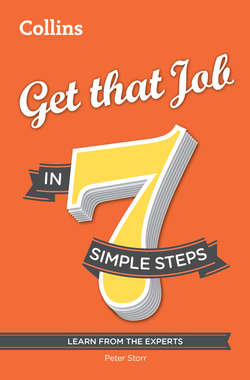Читать книгу Get that Job in 7 simple steps - Peter Storr - Страница 23
Identifying your interests
ОглавлениеWe said earlier that we tend to be good at what we enjoy. The same is true of what interests us. What interests us and what we’re good at aren’t quite the same, however: we can be good at ‘things’ but are interested in an idea or a particular discipline or sector. For example, you may be fascinated by the world of accounting and finance; this may relate to being good with numbers, but it’s not necessarily the same thing.
If you are fortunate enough to have a clear interest or desire to work in a particular area, then you are indeed very lucky. You may have to be flexible and creative in how you break into that sector if you’re not in it already, but knowing that you want to get there is a great start. It makes your targeting of that sector more simple and elegant, and when we come to Step 3 (Know your skills and strengths) you will be able to ensure they reflect the sector you have aspirations to join or progress in. We’ll mention this again later, but a great principle to live by is: ‘Begin with the end in mind’ – work out what you want to achieve and work backwards.
I mentioned at the start of this book that I began my professional working life as a bank clerk. I hadn’t been particularly happy in this role for a couple of years, but – sensibly, some might argue – I didn’t feel that I could leave until I knew what I wanted to leave to. It took a while for me to go from ‘banking isn’t it’ to ‘studying psychology is’. Once I had a good idea of where I wanted to go, it was far easier to take the plunge!
Many of us, however, are not clear about what we ultimately want. It’s important not to get demoralised by this. Not many people wake up when they’re 15 and say to themselves: ‘I want to be a doctor’ and then follow through on the ten-year plan to get there. Those that do are usually successful (as the ‘Begin with the end in mind’ principle would suggest), but it doesn’t happen for most of us.
If you have clear interests career-wise, then so much the better. If not, what then? Well, to start with, the links between our interests and the world of work are not always obvious – and indeed, we may have separated them in our head: ‘This is what I’m interested in, and this is what I will do for a living …’. It’s a useful exercise to occasionally question the assumptions we have allowed ourselves to believe.
You may think that it’s obvious to you what your interests are. But it’s worth going through this exercise because many of us don’t make the link between our interests and the world of work. They don’t have to be the same (you may have an interest in the natural world but don’t necessarily want a career in it), but it may prompt some ideas. And if you can work in an area where you have a personal interest, it won’t feel as much like work.
Ask yourself these questions and write the answers down:
What do you find yourself drawn to when you read a newspaper?
What non-fiction books do you read for fun?
What do your friends think you are particularly knowledgeable about?
What particularly interested you at school?
What are your main hobbies?
What is it about these hobbies that particularly interests you?
What would you say are your key interests?
If you were forced to give a presentation on any subject, what would it be?
What jobs or careers might link to these areas of interest?
Does anyone in the network you identified in Step 1 have links with these areas?
Who else do you know who has this interest? What are their ideas?
Determining your values
As well as working out what interests us, determining our values can also help us to identify what we want from our work. Values are our core beliefs about what is right and wrong and what is important to us. The culture we were brought up in, the way we were parented, our religion and our experiences as children and as adults all have an impact on our values. They can be treated as a route map: an inner voice or guide – or sometimes our conscience – and ultimately lead us to determining our behaviours and attitudes.
When we act against these values, we get a ‘pricking’ of our conscience. Psychologists call this ‘cognitive dissonance’. It’s an unpleasant feeling and it’s unpleasant for a reason: it’s there in order to prompt us to change either the belief/attitude or the behaviour, to make the tension go away. If you were vegetarian and got a job in a butcher’s shop, for example, the tension between your values and your behaviour would make it harder to perform well because you wouldn’t enjoy it. It’s always worth listening to this tension – this inner voice – because when we behave in accordance with our values, we become more fulfilled by what we’re doing.
